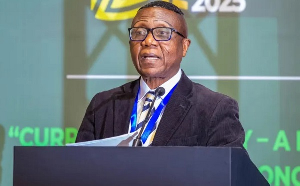The example of Quality Grain Rice
By Sydney Casely-Hayford, www.ghananewsmonthly.com
Corruption has become the blight of Ghanaians. The NPP accused and prosecuted every NDC politician they could lay their hands on when they took over in 2001. The NDC government has now turned the tables and in turn is doing the same to NPP ministers and all. This clearly will go on through and hopefully end with the NDC term. Prayerfully, an NPP government will have learned its lessons and not go prosecuting from the hip if they get another chance to run the affairs of state. Similarly, the NDC will also let matters be and not prosecute for political gain.
You don’t need to look too far a field to see all the corruption in our country. Ghanaians voted for change in government and welcome the prosecution of theft, constantly in search of a less corrupt society. We try to differentiate a “Nigeria 419” from our “Ghana sakawa” in an attempt to brand our corruption.
When you look back on some of the more celebrated cases in recent times, you can tell when a scheme is going down “corruption-avenue”. The two simple things we are missing to avert most corruption schemes are full public disclosure; and strong government institutions, with executives who don’t have to duck and dive for political survival.
Look back to the Quality Grain Rice fraud case, when the NPP government prosecuted and jailed former agricultural minister Ibrahim Adam, former finance minister Kwame Peprah and now minister for Health Dr. George Yankey on several counts of causing financial loss to the state. Justice D.K. Afreh decided the case on April 28, 2003 in Accra.
Here is the corruption guide and how it works. You need a cocktail of poor oversight, lack of attention to detail by a high level politician, the ability to circumvent and re-interpret the rules and laws of Parliament and the belief that someone higher than you on the political food chain who can affect your position is involved in one way or another with the beneficiary of a facility. Lastly, a dash of fear of losing your small “chop-chop” position. It is even easier if you usurp another government institution’s job. Juliet R. Cotton of Quality Grain Rice met and lobbied former president Rawlings in the USA in 1994 and proposed a rice project in Ghana to alleviate the pressure on imports. As part of the due diligence, then USA Charge D’affaires Amoa-Awuah had reported in 1992 that Quality Grain Rice was not a credible company. This was further supported by Ambassador Kobby Koomson in subsequent reports to Accra and directly to then President Rawlings. Amoa-Awuah’s report recommended an alternative company from East Bernard, Texas called AG-AM Corporation and clearly advised not to go with Ms. Cotton. Mr. Rawlings was to stay involved in the case to the end. The accused attempted to use a defense of “superior orders”, which was not accepted under Act 29, S.20. Even though no one specifically said so, the defendants clearly recognized the “Old Man” behind Ms. Cotton.
When now president Mills was made vice president and placed in charge of the economic management team, he inherited the Quality Grain Rice project. He testified to the court that “ …. throughout my four years as vice president, there was no project which occupied more of my time than this Quality Grain Project”. There were many red flags all over the case and they were all ignored. Why did the government fail to join in several suits against Ms. Cotton? Why did the government not accept the FBI’s (who finally prosecuted and jailed Ms. Cotton in the USA) invitation to sue Ms. Cotton? Prof. Mills said the reason for inaction was because the government had a “trump” card – a deed of indemnity and a floating charge on assets. However, due to poor oversight, the floating charge was never registered and therefore void under Section 107(1) of Act 179 and the terms of the indemnity were never enforced. Rather, the government gave Ms. Cotton another $2 million without parliamentary approval. After a first $7million tranche of the facility passed through parliament, all subsequent payments to Quality Grain were deemed to be the same. This was a completely false interpretation of Article 181 of the 1992 constitution requiring parliamentary approval of all new loans. The finance minister and his head of legal department managed to run rings around the system to approve more loans without further approval from parliament. Former Governor of the Bank of Ghana, Dr. G.K. Agama complained about the legal department in the ministry of finance, which had usurped the role of the solicitor-general as advisor to the Bank. He wrote to former Attorney General Obed Asamoh to review the process of approving foreign loans for government as required under Section 48(2) of the 1992 Bank of Ghana PNDC Law 225, which ensures that all relevant cabinet/parliamentary and other approvals had been obtained by the minister of finance. His protest was ignored by the finance minister even after the A-G had formally informed him of the complaint. Both of them were powerless to make the proper corrections. In the end Ms Cotton nearly got away with it all, if not for the fact that the EXIM bank was involved, it was a federal crime in the USA, the FBI investigated and she was prosecuted for the crime against the government of Ghana and the USA.
Then Vice President Mills had all the facts, spent a large dose of his time on the project, by his own admission, but still overlooked all the glaring loopholes in the project. He allowed political expediency and other pressures to blind-side him into making poor judgment calls. The Bank of Ghana and the Attorney General as institutions with authority to trap such attempts to by-pass the laws of foreign borrowing were powerless in the face of the legal department within the finance department, (which should not have been there in the first place) to flex their regulatory authority. Then of course, no one could bell the “old man”. This deadly cocktail of poor oversight, weak institutions, fear of the “old man” and self-serving politics is our corruption problem. There wil always be corruptible elements in society. We have the laws in place, we just do not apply them.
Now we wait for the Ghana@50 probe. I am betting that the same pattern will emerge. It is so easy to do in Ghana.
Opinions of Monday, 3 August 2009
Columnist: Casely-Hayford, Sydney














